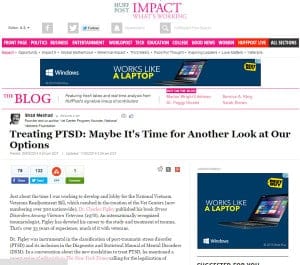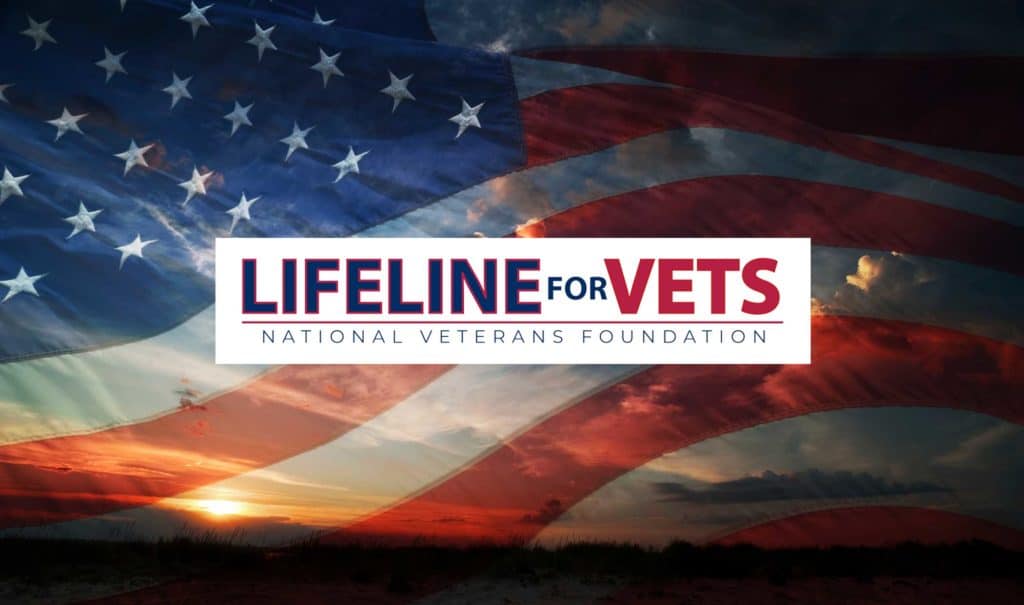Treating PTSD: Maybe It’s Time for Another Look at Our Options
From Shad Meshad’s Blog at the Huffington Post
 Just about the time I was working to develop and lobby for the National Vietnam Veterans Readjustment Bill, which resulted in the creation of the Vet Centers (now numbering over 300 nation-wide), Dr. Charles Figley published his book Stress Disorders among Vietnam Veterans (1978). An internationally recognized Traumatologist, Figley has devoted his career to the study and treatment of trauma. That’s over 35 years of experience, much of it with veterans.
Just about the time I was working to develop and lobby for the National Vietnam Veterans Readjustment Bill, which resulted in the creation of the Vet Centers (now numbering over 300 nation-wide), Dr. Charles Figley published his book Stress Disorders among Vietnam Veterans (1978). An internationally recognized Traumatologist, Figley has devoted his career to the study and treatment of trauma. That’s over 35 years of experience, much of it with veterans.
Dr. Figley was instrumental in the classification of PTSD and its inclusion in the DSM. In a conversation about the new modalities to treat PTSD, he mentioned a recent series of articles in the New York Times calling for the legalization of marijuana.
According to the series, the case against marijuana goes back to the 1930’s. It was not science-based then and, judging by our current laws and sentencing, we haven’t altered our basic thinking about it. Figley agrees. New evidence has been largely dismissed or ignored. Marijuana was criminalized over forty years ago, yet estimates are that over 30 million people are using it today. That’s not much headway. Meanwhile, although alcohol and tobacco are known to be more addictive and certainly more costly in terms of “collateral damage,” they remain in wide use.
Figley thinks we should re-evaluate medical marijuana for use in treating trauma like PTSD, especially in the face of veterans being over-prescribed pharmaceuticals and psychotropic drugs, sometimes several at a time, and often very powerful ones, to treat the symptoms of PTSD. For the VA, a quick prescription can be an easy answer to the onslaught of returning veterans suffering from PTSD. It moves vets through the system, but at a high cost to their overall health and with a limited chance for real recovery, management and transition back into civilian life.
I’ve talked here before about other modalities to treat PTSD. They include breathing techniques, acupressure and acupuncture, yoga, exercise, EMDR (Eye Movement Desensitization and Reprocessing), TFT (Thought Field Therapy), cognitive and group therapy, hobbies and volunteering, to name a few. Figley thinks it’s time to re-consider what medical marijuana could do to alleviate the suffering of PTSD. Vets who have used it would doubtless agree.
Here at the NVF, we’re focused on helping our veterans heal from visible and invisible wounds. We hear from vets on our Lifeline for Vets about over-medication for PTSD. An open discussion and more information could lead to treatments more efficacious and compassionate than relying on pharmaceuticals. PTSD is a basic human response to war. Maybe there’s a more humane way to treat it.
You can be a part of our mission to help Veterans by making a tax-deductible donation!
About the Author
SUBSCRIBE TO OUR BLOG AND NEWS!
By submitting this form, you are granting: NATIONAL VETERANS FOUNDATION INC permission to email you. You may unsubscribe via the link found at the bottom of every email. (See our Email Privacy Policy for details.)
Related Posts




